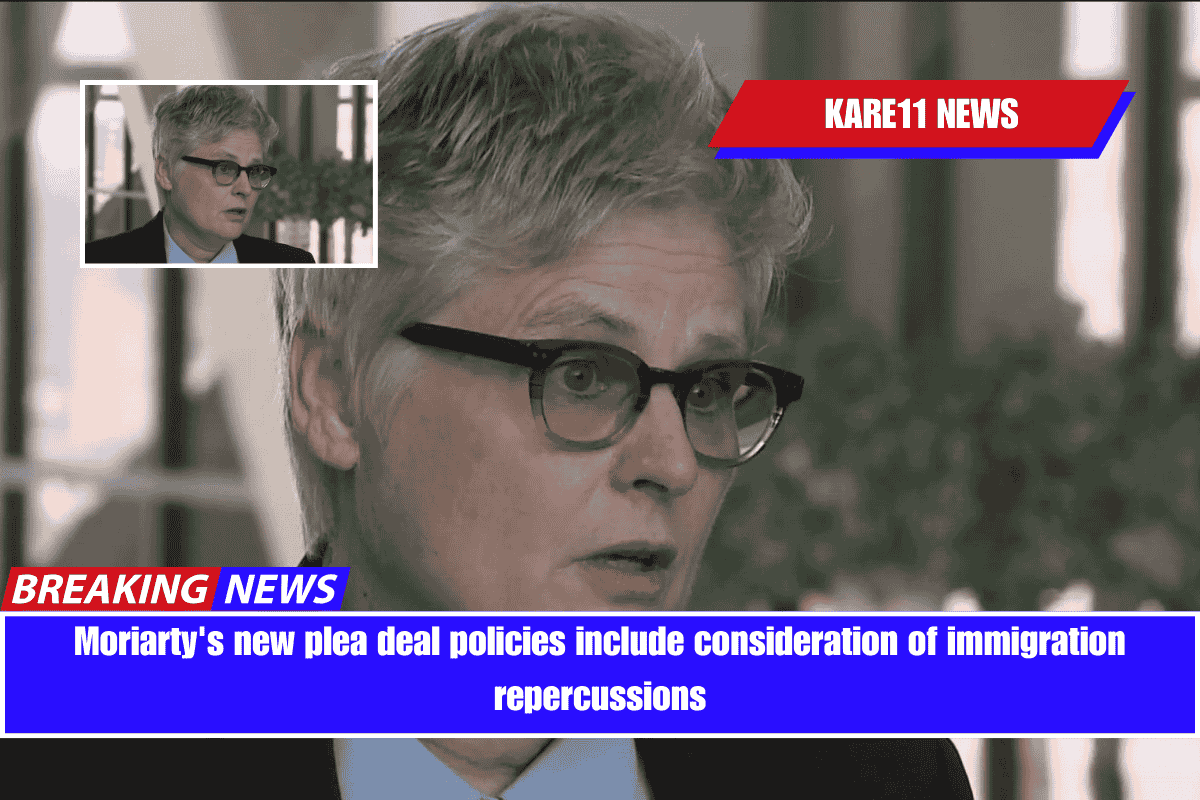Minneapolis — A new policy requiring Hennepin County prosecutors to consider a defendant’s race when negotiating plea deals went into effect on Monday, April 28.
The contentious policy has sparked debate and raised constitutional concerns since KARE 11 News first reported it on Friday, April 25, citing internal documents obtained by reporter Lou Raguse.
In addition to its race-based provisions, the new policy significantly alters how prosecutors handle cases.
A related “collateral consequences policy,” which went into effect on April 23, requires prosecutors to consider any collateral consequences that a defendant may face at any stage of the case. The policy provides examples such as “immigration impacts,” loss of employment, public benefits, housing, and student financial aid.
Prosecutors must notify a supervisor if they learn that a defendant is facing “major collateral consequences” as a result of prosecution.
The plea negotiation policy, which went into effect on Monday, also establishes new rules for when prosecutors must seek supervisor approval before offering a plea deal for less than the Minnesota Sentencing Guidelines. Plea offers in domestic violence and sexual assault cases now require supervisor approval, but not for gun crimes, which carry mandatory minimum prison sentences.
Prosecutors must also obtain supervisor approval before negotiating plea deals in “civil unrest” cases.
Here are the two policy documents given to Raguse:
Title: Negotiations Policy for Cases Involving Adult Defendants
Effective Date: April 28, 2025
Purpose
The purpose of this policy is to achieve safe, equitable, and just outcomes that center the healing of victims while improving community safety through individual and system accountability.
Policy
It is the policy of the Hennepin County Attorney’s Office that assigned prosecutors on cases involving adult defendants have full authority to negotiate a resolution consistent with the law, except for the following situations.
- Senior Attorney, Managing Attorney, Criminal Division Director or Deputy County Attorney support is required to:
- Dismiss the entirety of a criminal complaint (except in the case of a “one-for-one” disposition)
- On a case involving domestic violence or sexual assault against a victim: offer a dispositional departure or a durational departure or amend a complaint to a gross misdemeanor or misdemeanor from a felony
- Seek consecutive sentences due to eligible crimes or the presence of multiple victims
- Seek an upward departure at sentencing based on Blakely factors
- Managing Attorney, Criminal Division Director or Deputy County Attorney support is required to:
- Convene a Grand Jury to investigate or indict
- Convey an offer in a case involving death or civil unrest
- Request a prison sentence following trial where the offer on the same charge was a dispositional departure prior to trial
- Make an offer to resolve any case specifically identified by the County Attorney, Deputy County Attorney, Criminal Division Director, or Managing Attorney in Procase.
Procedural Considerations
1. Encouraging collaboration and coaching.
This policy reflects the expectation and belief that all prosecutors are tasked with seeking a just outcome in every case they work on. However, no individual can be expected to do so alone, and achieving just outcomes will necessitate prosecutors engaging in dialogue, collaboration, and consultation with colleagues and stakeholders.
As a result, when exercising their discretion and authority, assigned prosecutors on cases are expected to consult with Senior Attorneys, Managers, and their colleagues. Some offers are simple to understand, while others are more complex. Attorneys should consult with colleagues and supervisors about developing safe, equitable, and just resolutions. The people in this office are its most valuable resource, and collaboration and consultation are two of the best ways to tap into it.
To support the effective implementation of this policy, supervision will shift to a coaching and support focus, rather than permissions-based engagement as was previously practiced. Senior Attorneys and Managers will be expected to meet on a regular basis with prosecutors from their teams to discuss cases.
2. Incentivizing early acceptance of responsibility.
As soon as possible, offers should be made that reflect the strength of a case and ensure a safe, equitable, and just outcome. While cases may eventually deteriorate, offers should not “improve” over time in order to avoid litigation. There is no expectation that an early offer that was rejected will be reopened, especially in cases where litigation has occurred. Seeking early acceptance of responsibility, where appropriate, saves significant resources for the state and may prevent additional trauma for victims.
3. Victim input on offers should be considered and incorporated where appropriate.
While prosecutors do not represent victims, it is critical to respect their rights and to consider what can help a victim heal throughout the case. Prosecutors should communicate with victims early and often to keep them informed, even if they disagree with the State’s legal approach. Any victim input must be weighed against the other goals of rehabilitation and public safety.
4. Resolutions should be based on individualized analyses that consider sentencing guidelines and departure grounds (both mitigating or aggravating).
The Minnesota Sentencing Guidelines are the starting point for developing an offer in any case. However, there are times when deviating from the guidelines is appropriate. These deviations should be based on a thorough examination of the case and the accused, including what would benefit long-term public safety. For example, in a situation where the person charged has previously served time in prison for a different offense, it may be appropriate to dispositionally depart to a non-incarceration option in order to achieve public safety. In other words, a person’s criminal history should inform, not control, their decisions.
While racial identity and age are not appropriate grounds for departure, proposed resolutions should take into account the person charged as a whole, including their racial identity and age. While these factors should not be used as control variables, they should be considered in the overall analysis. Racial disparities harm our community, foster distrust, and have a negative impact on public safety. Prosecutors should identify and address racial disparities at the appropriate decision points. Similarly, brain development science confirms that human brains do not fully develop until the mid-20s, with the pre-frontal cortex being one of the last areas to do so. This has an impact on many important functions, including impulsivity, the ability to weigh risk and consequences, empathy, and susceptibility to peer pressure. Prosecutors should base their decisions on science, research, and evidence-based practices.
5. A broader range of dispositional options should be considered.
The previous practice of making offers within the HCAO followed a continuum. For example, a drug offender may be offered diversion for the first offense, a 152.18 stay of adjudication for the second, followed by a stay of imposition, a stay of execution, and so on. There may be times when additional opportunities to participate in diversion or consecutive stays of adjudication or imposition are necessary. Stays of adjudication should be considered for use when needed. Offers should be specifically tailored to the person charged at this time in their life, while also taking into account what is required to prevent future harm to the community.
It is important to remember that, regardless of the stay type or the charged crime, probation evaluates the person charged to determine the appropriate level of supervision.
Title: Collateral Consequences Policy
Effective Date: April 23, 2025
I. Meaningful Consideration of All Collateral Consequences
The Hennepin County Attorney’s Office (HCAO) will take all collateral consequences into account at every stage of the case. Meaningfully considering those consequences does not imply that the HCAO will agree to a resolution that mitigates them. Instead, the HCAO will assess each case individually. Nothing in this Policy should be interpreted to contradict state or federal law.
II. Procedure for Pre-Trial Cases with Major Collateral Consequences
“Major collateral consequences” refers to collateral consequences that are likely to result from a prosecution and are at least in part determined by the defendant’s individual circumstances, as opposed to consequences that every defendant would face as a result of the same prosecution. Examples include, but are not limited to:
- loss of or inability to obtain employment or an occupational license or permit
- loss of or inability to obtain public benefits, including public or subsidized housing and student financial aid; and
- immigration consequences.
Prosecutors will notify their Division Manager and the Designated Senior Attorney as soon as they discover, learn, or are informed that a defendant faces significant collateral consequences. Prosecutors will then complete the checklist (attached as Addendum 1).
The HCAO is not obligated to, and should not, conduct independent research or investigation into the adverse collateral consequences of a prosecution. This type of analysis must be fact-specific and take into account a wide range of relevant factors. Furthermore, the HCAO will never provide affirmative advice regarding collateral consequences.
III. Procedure for Post-Conviction Cases with Major Collateral Consequences
When the appellate unit receives a request for post-conviction relief from a defendant facing significant collateral consequences, it notifies the Designated Senior Attorney, who reviews the petition.
- As of the Policy’s effective date, Eder Castillo is the Designated Senior Attorney in charge of its administration.


















Leave a Reply